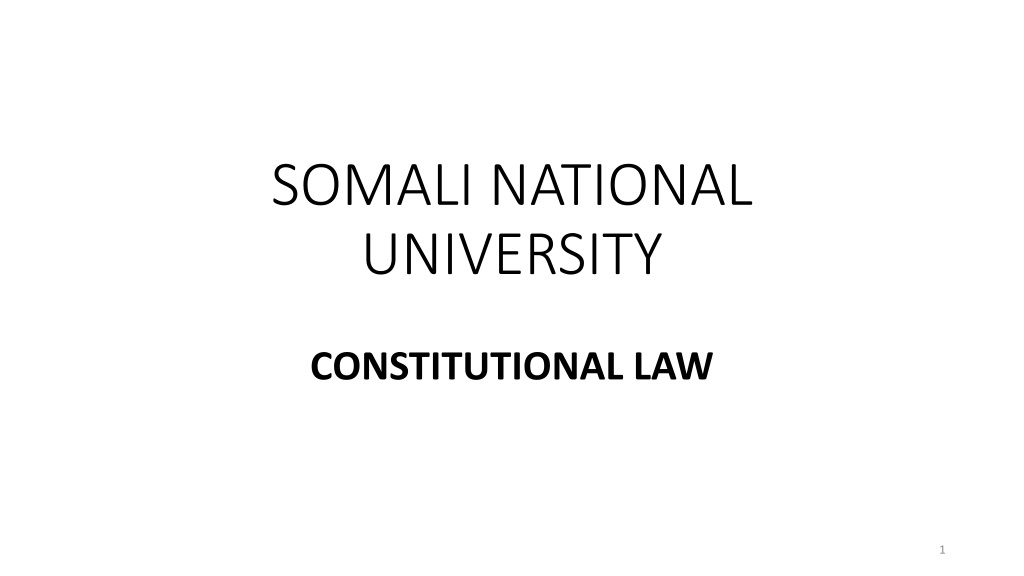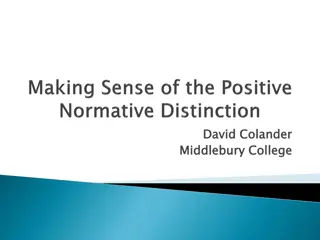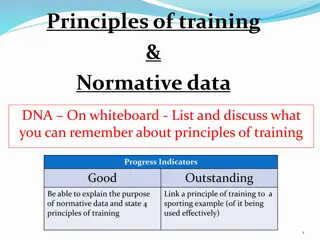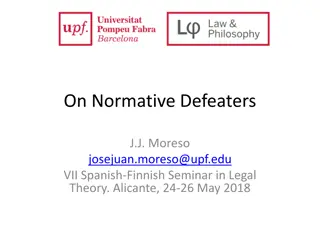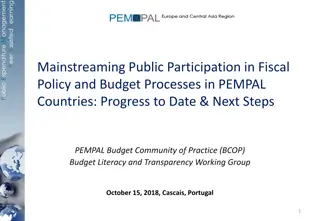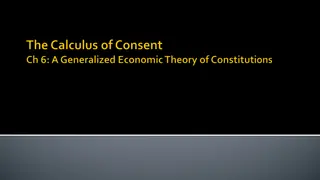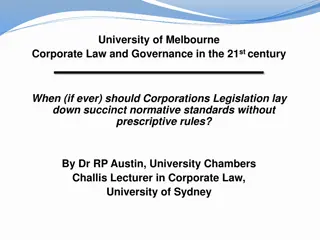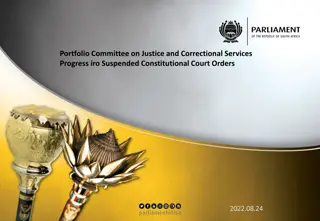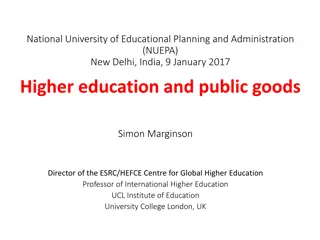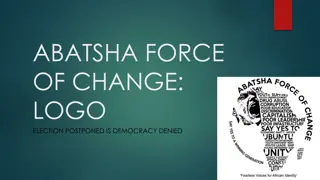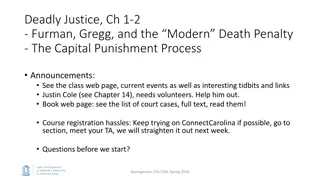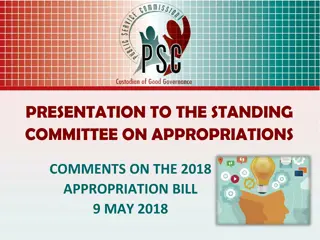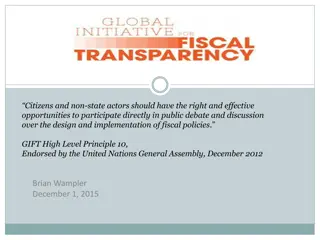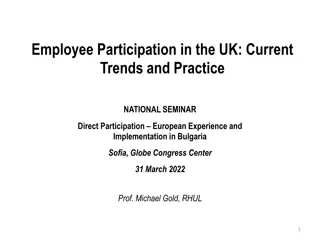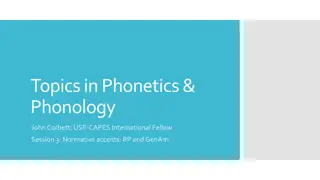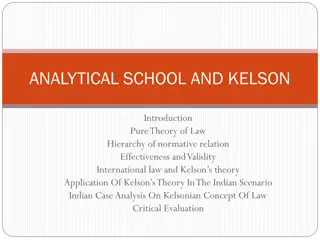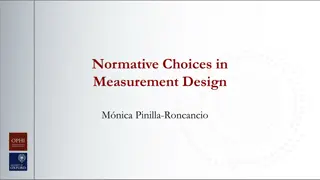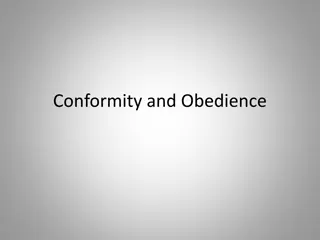Normative Standards for Public Participation in Constitutional Making Process
This article delves into the importance of public participation in the constitution-making process, highlighting effective methods such as consultation, inclusiveness, and credibility of reviewing bodies. It emphasizes the shift towards participatory constitution-making and the necessity of involving stakeholders at all stages as a measure of democratic legitimacy.
Download Presentation

Please find below an Image/Link to download the presentation.
The content on the website is provided AS IS for your information and personal use only. It may not be sold, licensed, or shared on other websites without obtaining consent from the author. Download presentation by click this link. If you encounter any issues during the download, it is possible that the publisher has removed the file from their server.
E N D
Presentation Transcript
SOMALI NATIONAL UNIVERSITY CONSTITUTIONAL LAW 1
PUBLIC PARTICIPATION Introduction Normative standards for constitution making o Effective Participation: The right of rights. o Consultation on the process and the content Inclusiveness of the process. o stakeholders o The role of civil society organisations. o The role of religious leaders . o The role of women o Minorities and marginalised . The level of civic education and awareness campaigns Credibility and competence of the reviewing organ Political will Timing. The referendum. 2
PUBLIC PARTICIPATION Introduction Traditionally, the drafting-process of a new constitution was placed into the hands of national elites, requiring the people s consent only at the stage of final ratification. But over the past twenty years, an approach of new constitutionalism has emerged, which is focused on participatory constitution-making . The process of drafting a constitution and the manner of organizing such a process are very important and sensitive issues. This new approach is characterized by more transparency and by broad-based public participation. Participation purports the legitimation of a new political order by creating a link between the framers of the constitution and the public; 3
PUBLIC PARTICIPATION (cont.) Normative standards for constitution making o Effective Participation: The right of rights. There are no universally accepted norms and standards that apply to constitution making. Different modalities and methods of constitution making have been adopted by different countries. The starting point for any constitutional system is necessarily a political fact and the process is a political decision that aims at addressing a political and sociological fact often known as the Grundnorm ("fundamental norm. ). There seems to be a consensus that people are the custodians of democracy and should be involved at all stages of constitution making. Public consultations are a valuable tool to guide the review bodies in involving civil society, rule of law actors, and other stakeholders in the constitutional review process. 4
PUBLIC PARTICIPATION (cont.) Today, the legitimacy of a constitutional process and the constitution itself is measured by the degree to which the process is participatory, open, democratic, socially inclusive, and transparent, and where those drafting the constitution are democratically legitimized and accountable. This approach makes the constitution the fundamental decision of the people to be governed and provides for the necessary democratic legitimacy; Effective public participation implies the involvement of the public at all stages of the constitution making including in the selection of members of the review process. 5
PUBLIC PARTICIPATION (cont.) The process of constitution making can only claim legitimacy and credibility if the people have been meaningfully involved in each stage of the process. Generally, a constitutional process may be characterized by four phases: 1. The preparatory phase; 2. The constitutional drafting phase; 3. The public consultation phase; and 4. The final review and adoption phase. 6
PUBLIC PARTICIPATION (cont.) First Phase: Preparatory Phase Initial negotiations concerning procedure, an outline of the process, and the establishment of realistic timetables. Agreement on a set of basic principles that will guide the constitutional process. Initial public education and consultation, national dialogue of the constitutional changes or potential revisions. The possible adoption of an interim or transitional constitutional document. The establishment of a constitutional commission. 7
PUBLIC PARTICIPATION (cont.) Second Phase: Constitutional Drafting Phase The establishment of an elected constitutional commission or assembly that will oversee the drafting of the final document. Extensive consultation with legal experts and advisors, the international community, a broad array of stakeholders, all political parties concerned, and the public at large. The preparation of an initial draft of the constitution, via transparent drafting committees, and regular input from the public, and select international advisors, as well as domestic and international legal advisors. 8
PUBLIC PARTICIPATION (cont.) Third Phase: Public Consultations Period Nation-wide public and civil education, media campaigning, reception of public comments and suggestions. The use of traditional and innovative modes of mediation and public dialogue, before or during the initial drafting of the new constitution. Structured participation by all groups, especially women, minorities, all political and opposition parties, and the civil society. 9
PUBLIC PARTICIPATION (cont.) Fourth Phase: Final Review and Adoption Phase A review by the constitutional commission, parliament or the courts, as well as the public, for necessary revisions, amendments, or greater public input. The broad approval and adoption of the final text via the constitutional commission, elected representatives, or a national referendum process. A post-adoption process of public education, national ratification, and conference of legitimacy on the final product. 10
PUBLIC PARTICIPATION (cont.) o Consultation on the process and the content In order to conduct successful public consultations, there are several practical steps the members are suggested to take before holding the public consultations, including: identifying stakeholders, conceptual design, self-reflection, and scheduling of the consultations. The South African Constituent Assembly pursued consultation based on the fundamental components of political representation, organized formations outside parliament and individual citizens. The South African process aimed at not only ensuring that people are part of the process but also that the process had to be seen transparent and open. 11
PUBLIC PARTICIPATION (cont.) Consultation empowers the people since they are able to make effective contributions and submissions, indicating what they want to be included in the constitution. There is a need of direct participation by the population in the constitution-making process, in the form of civic education and popular consultation rather than being crafted behind closed doors by a small number of professionals and politician Thus, the constitutional process can provide a forum for national dialogue and education regarding issues and decisions that are vital to the future direction of the country. s. 12
PUBLIC PARTICIPATION (cont.) South Africa, Eritrea, and Rwanda are successful examples to this extent. In these processes, a carefully planned program of civic education was conducted so as to educate the population on the role of a constitution and their role in the process of making a constitution. During this program of civic education it was established which issues were the most important for the population at large; Uganda s constitution-making process was a very unique exercise to increase civic involvement during the early period of the democratic transition. The eight year long process was carried out by local leaders, funded and supported by external donors, and enriched by local civil society organizations. 13
PUBLIC PARTICIPATION (cont.) In 1988, the National Resistance Movement (NRM) government established a 21-member Ugandan Constitutional Commission (UCC) and instructed it to seek the views of the general public through the holding of public meetings and debates, seminars, workshops and any other form of collecting views and to stimulate public discussion and awareness of constitutional issues . Numerous public gatherings throughout the country were held working through local institutions so that poor, rural, and illiterate citizens could participate along with the elites concentrated in the capital city. 14
PUBLIC PARTICIPATION (cont.) The South African constitution making process demonstrated the important role of the civil society in constitution making. The submissions by gender activists groups and other civil society organisations clearly had an impact on the constitution making process. The South African experiences shows that civil society organisations were successful when they worked together on issues, especially lobbying for a comprehensive bill of rights in the constitution. Civil society organisations in South Africa, such as the Legal Resource Centre and the National Association of Democratic Lawyers provided submissions for the inclusion of socio economic rights in the constitution. 15
PUBLIC PARTICIPATION (cont.) Civil society organisations have been recognised as an important force in constitution making process. Members of the civil society, both registered and unregistered, should be allowed to present their views both on the content and the process of constitution making. The South African constitution making process demonstrated the important role of the civil society in constitution making. 16
PUBLIC PARTICIPATION (cont.) The role of religious leaders The right to religion is enshrined in most international human rights documents. Religion plays an important role in society s organisation and functioning. The constitution making process ought to include the religious leaders so as to achieve an inclusive constitution. 17
PUBLIC PARTICIPATION (cont.) The role of women Constitution making ought to be inclusive and must protect all especially vulnerable members of the community. In most African patriarchal societies where women have limited or no rights, constitution making is an opportunity to address gender inequality. Women participation in the constitution making process is also very important for fostering democracy and human rights. Women associations, both rural and urban, should be involved in the consultation phase. 18
PUBLIC PARTICIPATION (cont.) Minorities and marginalised The process of constitution making should put into account the concerns of minorities and the marginalised. The minorities could be tribal or other divides depending on a particular society. The disadvantaged include all those who have been exploited by the political, economic and social structures. In any process of decision making, equal rights and justice should be of primary consideration. The exclusion of minorities from the process of constitution making affects the democratic character of the process. 19
PUBLIC PARTICIPATION (cont.) The level of civic education and awareness campaigns The process of constitution making must empower the people through civic education programmes. The population must be educated about the role they are supposed to play in the process of constitution making. The people must be informed about the constitutional framework and the possible considerations available to them in forming the constitution. The Rwandan and South African constitution making processes have been hailed for the levels of education campaign they conducted both in the rural and urban communities. 20
PUBLIC PARTICIPATION (cont.) The South African experience of constitution making provides a good example on the role of a civic education programme that target grassroots. The South African Constituent Assembly decided to run an extensive constitution education programme before seeking for public submissions. It has been noted that constitutional education is not only important for quality submissions but it also creates awareness in the community. The public education programmes help in situations where the process is politicised and the people are inclined to vote for parties and leaders instead of the document. 21
PUBLIC PARTICIPATION (cont.) Civic education can take various forms including disseminating information in public gatherings, workshops and the media. It should also include visiting constituencies since the majority of the people can not access newspapers, radio and television. In the case of South Africa, due to the fact that a significant proportion of South African population, often illiterate or semi illiterate was unable to access information about the constitution- making process, either in print media or television the need for constitutional education about the public participation programme was crucial. 22
PUBLIC PARTICIPATION (cont.) Credibility and competence of the reviewing organ The organs tasked to carry out the review process must enjoy a sense of credibility in the process. The commissioners and experts must be trustworthy, reliable, competent and persons of integrity. The organs of the review process must be de-linked from the political struggles of those in power and be able to serve the interest of the people who are the custodians of the process. The credibility and competence of the organs, commissioners and experts has an impact on the out come of the process. The commissioners and experts should work towards implementing the wishes of the people than safeguarding the interests of the various political players in government. The credibility and competence of organs, commissioners and experts has an impact on the outcome pf the process. 23
PUBLIC PARTICIPATION (cont.) Since independence it has been a practice for many African countries to adopt constitutions through the use of commissions and experts; These commissions and committees of experts have come under criticism for failing to produce durable and long lasting constitutions; The commissions and committees have always been susceptible to manipulation by those in power who have often imposed their own constitutional order; The Zambian experience of the draft Constitution of 1996 demonstrates how constitutional making by the Commissions can be influenced by the government in power for their own interests and commissioners being divided along the different power struggles. 24
PUBLIC PARTICIPATION (cont.) The selection and final appointment of the commissioners should be credible and impartial so as to gain legitimacy and confidence from the public who are the custodians of the constitution. The danger of constitutional elitism surfaces in cases where those engaged in the constitution making process are well known politicians with vested interests. The authenticity of a constitution as a product of the personal credibility of individuals who are not influenced by socially acceptable interests and whose personal integrity is respected in the community. 25
PUBLIC PARTICIPATION (cont.) Political will Constitution making is also a political process. The people in position of power will ensure a process and machinery that protects their interests. The opposition parties will see this as an opportunity to change the government. In power sharing governments, the question seems to be more complex as there is always no consensus on leadership and policy issues. It has been argued that governments, aware of the politics involved in constitution making, have often shaped the choice and process of constitution making with the view to protect their interests. 26
PUBLIC PARTICIPATION (cont.) The Eritrean and the Kenya previous Bomas conference are constitutional making process which fulfilled most of the requirements of participatory democracy but were brought down by leaders. It has been suggested that the political leadership needs to be an honest broker throughout the whole process with the spirit of nation building. It is believed that Society will not attribute legitimacy to the constitution if the leadership is seen corrupt or having mala fides. Political will remains one of the fundamental and underlying foundations of achieving a constitution order. 27
PUBLIC PARTICIPATION (cont.) Timing In constitution making, the time allocated for each stage and phase matters; The problem is that in most countries, constitution making process set the foundation in post conflict countries for incoming elections. This leads the drafters and the organs to work under time constraints, some times even omitting important information that would have been received from the pubic. It is also more problematic when the constitution making process is happening immediately after or before a political moment in country s history. In countries that are preparing for election, it would be difficult to identify the genuine interests of the various groups and parties as some of contributions will be based on partisan politics and power. The difficulty of timing in South Africa as the constitution making process happened after a liberation election . It was difficult for the ordinary south African citizens to distinguish the process and the government s delivery of services. 28
PUBLIC PARTICIPATION (cont.) More important are the time frames allocated for the constitution making process and how they impact the outcome. The South African constitution making process took six years owing to the history of apartheid and the prolonged dialogue between the stake holders. The Nigerian Debate Coordinating Committee in Nigeria was given two months and this was criticized as minimal and impugned upon the quality of the content. If the time allocated to the organs and a commission charged with constitution making is minimal, it will have an impact on the outcome of the process. An effective constitution making process should allocate sufficient time to each stages of constitution making process to allow effective, professional and efficient process. 29
PUBLIC PARTICIPATION (cont.) The referendum The constitution making process sometimes ends with the people deciding through a referendum. A referendum is a mechanism which provides an opportunity to the people to decide on a particular issue or decision made by a governmental body. In constitutional making, the referendum will be the endorsement of the people to the constitution by the people. The process of how a referendum is organized is as important as the out come of a referendum. 30
PUBLIC PARTICIPATION (cont.) The public should be educated about the referendum politics. In some situations, this becomes an opportunity for those who are not satisfied with the process to hinder the constitution making process. The people must be educated and knowledgeable about the referendum process and how it is conducted. The people should be aware of what they are approving and disapproving through a referendum. The choice of the terminology of what to vote for in a referendum is as important as the contents of the referendum. The referendum organizing body should determine what people are voting for and against other than the referendum being an extension of political scuffles and fights. Referendums should be seen as making decisions on laws that will affect policy and decisions not voting for political parties in power. 31
PUBLIC PARTICIPATION (cont.) Conclusion Modern Constitution making has introduced normative principles and paradigms under which the process should take place. In order to have legitimacy, the process of constitution making should satisfy certain requirements. The people should be able to understand the importance of the constitution and should have knowledge of both the process and the content. The role of political parties is necessary but should not be given prominence over the people who are the custodians of the constitution as political parties often pursue partisan interests. The role of experts should also be recognized but they should only play an advisory role and they can not replace the role of the public in the drafting process. Experience from various countries has shown how the process of constitution making reveals a pattern of actors, including political 32
